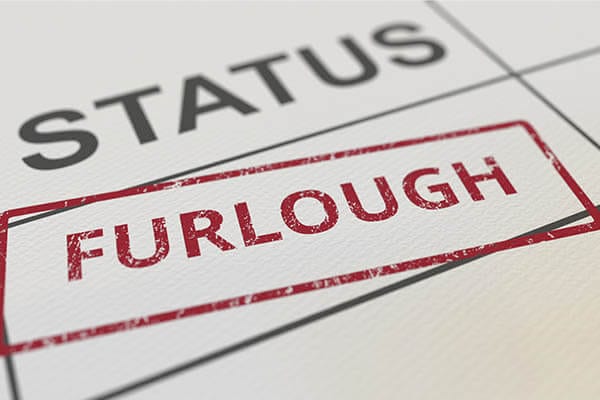Remember the good old days? Just a few long months ago, the economy was roaring and nobody outside Wuhan had ever heard about coronavirus.
Now millions of Americans are in a place they never thought they’d be – the unemployment line.
The relatively lucky ones are just on furlough. They might get their jobs back, but who knows when?
In the meantime, they’re probably asking how they’re going to manage their debt while on coronavirus furlough?
“COVID-19 has brought about unprecedented financial challenges to people and businesses around the globe,” TransUnion CEO Chris Cartwright said.
The credit reporting agency released a study in April that found 61% of U.S. consumers have been financially impacted by the pandemic.
Just 61%? It feels as if it’s 100%. If you’re on furlough and are not sure when your next paycheck will come, don’t be like all those who hoarded toilet paper.
There’s no reason to panic. Actually, there might be in some cases. But in these uncertain times, you can still control your financial destiny.
Help Is on the Way
You might have already gotten some of it. Between Congress and the Federal Reserve, the government has committed more than $6 trillion to stop the economic damage.
Many companies are also offering help to those who are struggling financially. It’s a response not seen since the Great Depression, and anyone who grew up then learned the importance of avoiding debt.
Unfortunately, that lesson was largely lost in the past couple of generations. Total consumer debt was $14.1 trillion in 2019, according to Experian. That worked out to an average of $90,460 per American.
Tips to Manage Money While on Furlough
More than half the population didn’t have an emergency fund, according to the AARP Public Policy Institute. And that was in the good old days of 2019, when the economy was roaring and a rainy-day fund didn’t seem all that vital.
Now we’re in a financial monsoon. If you’ve been furloughed from your job, here are some tips that could help get you through:
Apply for Unemployment
State benefits vary, but the Coronavirus Aid, Relief, and Economic Security Act (CARES Act) supplemented those benefits with an additional $600 per week. If you live in Massachusetts, you can now receive up to $1,155 a week. The least generous state is Mississippi, but benefits are still as high as $707 per week. That $600 CARES supplement will be paid through July 31. It will not affect your eligibility for income-based health insurance like Medicaid of the Children’s Health Insurance Program.
Get on a Crisis Budget
Cut out all non-essential spending. That was a bit easier when stay-at-home orders were tight and there was nowhere to spend $100 on dinner. Now that states are allowing businesses to reopen, you’ll be tempted to get back to normal spending habits. Don’t! Eat at home, get a cheaper mobile phone plan, find a gym that charges only $10 a month for membership, re-think whether you need Netflix, Hulu, Sling and Amazon Prime.
Check for Relief with Your Service Providers
Many utility, cell phone and cable companies are making accommodations for customers. For instance, electricity providers are reducing rates and promising not to cut off service for those who can’t pay their electric bill. Internet and mobile services are waiving late fees and discounting fees. Reach out to see if you providers are offering temporary breaks for people impacted by the coronavirus crisis.
Be aware that your bill might be reduced, but it won’t be forgiven. So even though it’s getting hot outside, don’t set the thermostat at 66 degrees and run the air conditioner 24 hours a day. You’ll eventually have to pay for all that cold air.
Contact Lenders and Creditors for Help
Many banks, credit card companies and other lenders have hardship programs. Lenders might temporarily lower your interest rate or payment amount. They could also place your loan in deferment or forbearance, which suspends payment requirements. For example, the government has suspended both payments and interest charges on federal student loans until May 1, 2022. It also has relief packages for borrowers with federally-backed home loans.
Don’t Miss a Payment
Even if you can’t get a better deal from your credit card company, you should pay at least the minimum monthly charge. That amount should not be a budget-buster and paying it will protect your credit score.
Take a Walk
It won’t directly impact your financial situation, but a little exercise can relieve some stress. If you’re lucky, you might run into a neighbor who has some extra toilet paper they’ll lend you.
Consider a Balance Transfer
Some credit cards have an introductory offer of zero interest rate for a few months. You could transfer high-interest debt to that card, but it’s risky. If you don’t pay the balance transfer off before the introductory period ends, the interest rate skyrockets and you might be in worse shape than when you began.
Don’t Make Rash Decisions
You might want to tap into your 401(k) retirement account, especially since the 10% penalty for early withdrawals has been temporarily waived. Given the downward rollercoaster the stock market has been on, it could also be tempting to sell those investments. Remember the advice of investment guru Warren Buffett: “The stock market is a device for transferring money from the impatient to the patient.” Try to ride out this storm without touching your retirement nest egg. If you must, be sure to first discuss the ramifications with your company’s 401(k) representative or another financial advisor. Speaking of which…
Talk to a Credit Counselor
Nonprofit companies offer credit counseling and money-saving options like a debt management program. In a DMP, creditors offer lower interest rates, and if clients accept them, their bills are consolidated into one monthly payment that will be lower than what they were previously paying. Counselors then work with clients on a long-term budget that will get them out of debt. It could instill good financial habits that will pay off long after your furlough is over.
You never know when the next deluge might come. But when it does, what you do with this one can teach you more than just the importance of stocking up on toilet paper.

5 MINUTE READ
Home » InCharge Blog »

















